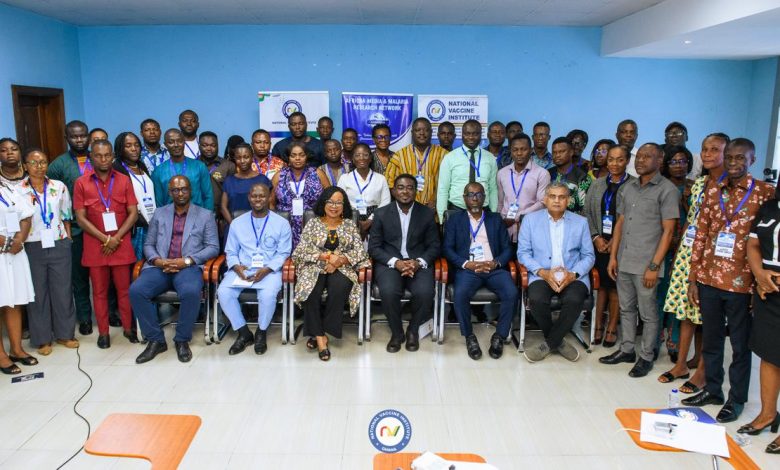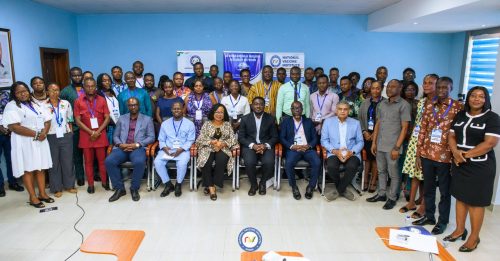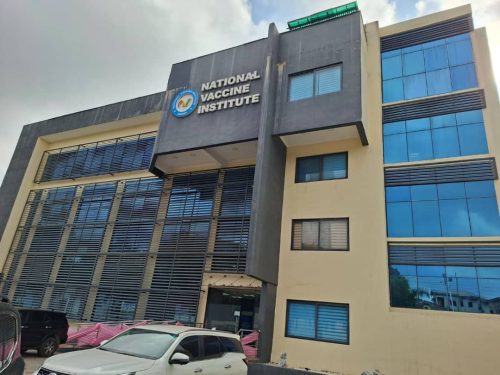NVI, AMMREN Train Journalists as Ghana’s Tetanus Diphtheria Vaccine set for 2026

The National Vaccine Institute (NVI), in collaboration with the African Media and Malaria Research Network (AMMREN) and Ghana Health Service, recently organised a two-day training workshop for selected journalists and media practitioners across the sixteen regions.

The training, which took place at the NVI conference hall in Accra from Tuesday, 11 to 12 November 2025, focused on equipping media professionals with accurate and up-to-date information on vaccines, as Ghana prepares to start local vaccine manufacturing by the end of 2026.
The training also aimed to enhance the capacity of journalists to report responsibly and effectively on health and vaccine-related issues.
Delivering a presentation on “Understanding the Local Regulatory Environment,” Pharm. Patrick Owusu-Danso, the Acting Director of the Centre for Laboratory Service and Research (CLSR) at the Food and Drugs Authority, noted their strict regulatory framework and enforcement as far as vaccine manufacturing is concerned.
According to Pharm. Patrick Owusu-Danso, the FDA, is responsible for vaccine clinical trials and testing, regulatory inspection, market authorization and surveillance, lot release, and regulatory functions and oversight for vaccine safety and detection.
He cited WHO, European Directorate for the Quality of Medicines and Healthcare, PEI, United States Pharmacopoeia, Network of African Reliance Laboratories, African CDC, and the National Vaccine Institute as key collaborators.
Dr. Sodzi Sodzi-Tettey, the chief executive officer of the National Vaccine Institute, highlighted the country’s progress towards producing vaccines locally.
According to NVI, President John Dramani Mahama has allocated $50 million as seed capital, alongside $113 million from Afreximbank, $978,334 from the World Bank, and £1.7 million in grants secured by NVI, all supporting Ghana’s local vaccine manufacturing agenda.
He noted that the NVI has been tasked by the President to ensure that Ghana produces local vaccine, thereby better preparing the country to manage future outbreaks as Ghana prepares to graduate from Gavi support by 2030.
According to the CEO of NVI, two local companies, including Atlantic Lifesciences, are on track to manufacture vaccines to conquer 16 targeted diseases and infections within the EPI following the signing of tech-transfer agreement.
He revealed that Atlantic Lifesciences is particularly advanced and set to produce its first vaccine, the Tetanus Diphtheria vaccine, in 2026.
The CEO, in a sideline interview with Kaakyire Kwasi Afari of Sunyani-based Ark fm said that products of the private led consortium DEK Vaccines Institute will include vaccines for malaria, cholera, typhoid, phenomena, and HPV against cervical cancer.
Dr. Sodzi-Tettey emphasised the importance of vaccination in combating diseases that affect children, women, and the general population and stressed the need for accurate vaccine-related communication to build public trust in immunisation.
Dr. Sodzi-Tettey acknowledged the crucial role of the media in shaping public perception and advancing health education in communities.
Dr. Naziru Tanko Muhammed, Deputy Program Manager for the Expanded Program on Immunisation (EPI) at the Ghana Health Service, expressed concern over vaccine hesitancy, citing WHO reports of its increasing trend.
However, in his presentation on “The State of Vaccine Update in Ghana: The Case of the Expanded Program on Immunisation”, he reveals that despite myths and misinformation about vaccination, Ghana made remarkable progress in conquering many childhood vaccine-preventable diseases.
Dr. Tanko highlighted that neonatal tetanus, polio, measles, pneumonia, and diarrhoea in children have been prevented through immunisation.
He added that 2-3 million deaths among children under age 5 are prevented annually through immunisation.
For her part, the Executive Secretary of the African Media and Malaria Research Network (AMMREN), Dr. Charity Binka believes that empowering the media with accurate knowledge and skills is key to promoting health and saving lives.
In her opening remarks, Dr. Binka acknowledged that effective health reporting will bridge the gap between science and the public, turning information into action and knowledge into confidence.

“AMMREN believes that when the media is well-informed, the public is well-protected,” she said.
Particularly in some communities, rumours and fear have led parents to refuse life-saving vaccines for their children; thus, she called on journalists to lead vaccination campaigns and combat myths and misinformation.
All the journalists received certificates of participation from the National Vaccine Institute after the two-day training.
*Source: Kaakyire Kwasi Afari. Ark FM, Sunyani*





